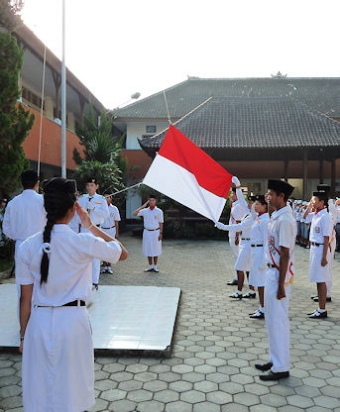Lyn Parker, Raihani and Chang-Yau Hoon
Independence Day in a Balinese schoolLyn Parker |
The cultural, linguistic and ethnic diversity of Indonesia is famed around the world and accepted within Indonesia. The national motto of 'Unity in Diversity' places diversity at the centre of the nation-state. But despite significant progress in democratisation, decentralisation and regional autonomy in post-Suharto Indonesia, old fears of federalism, separatism and disunity remain. Multiculturalism and pluralism are still often viewed with suspicion and paranoia is spread by extremists for their own ends.
The term 'multiculturalism' grew out of the civil rights movement in the US. Multiculturalism promotes ethnic and cultural diversity: how different cultures can live together peacefully, enjoying the freedom to express themselves but also being mindful of the rights of other groups. Recently in Western Europe 'multiculturalism' has been about migration and how minority groups, including Muslim minorities, should be accommodated. But in Indonesia the term has a foreign feel. In the Indonesian context, 'multiculturalism' is often said to be all about religion rather than culture. This claim seemed to be strengthened in 2005 when the Indonesian Council of Ulama issued a fatwa condemning pluralism, secularism and liberalism. This unfortunate fatwa has made it difficult for moderate Muslims who appreciate Indonesia's cultural and religious diversity, and ups the anti among other religious groups.
This edition of Inside Indonesia takes a look at many different efforts being made by diverse institutions and groups to create a multicultural discourse that not only advocates tolerance of difference but also encourages engaging with and learning about others. Most of these efforts can be seen as educational, broadly conceived: they are aiming to make the unfamiliar familiar, and to construct new knowledge and understanding. They particularly aim to enable minorities - of ethnicity, religious identity, gender and class - to be accepted and to feel they belong in the diverse 'imagined community' of Indonesia.
Seven different researchers contribute to this edition. Lyn Parker alarms us about Indonesia becoming less religiously tolerant, but argues that, in spite of this, some private schools and NGOs are making exceptional efforts to promote inter-religious understanding amongst students. Raihani identifies several programs which may enable the students of a pesantren (Islamic boarding school) to understand and tolerate the diversity of society. In the article that follows, Najib Kailani presents us with the story of a vocational school in Yogyakarta where minority male students are favoured by teachers to the extent that this creates jealousy amongst other students, and where minority non-Muslim students feel powerless in a dominating Islamic culture. Nick Long then brings us to the Riau Islands to explore the 'reinvented' concept of Malayness. Through Long's article, we learn how multicultural Malayness is enthusiastically disseminated through poetry and fosters new ways for people to learn whether and how they belong.
The remaining three articles examine how multiculturalism, or lack thereof, is practised in elite private schools in Jakarta. In arguing that education can serve as a tool for social segregation, Chang-Yau Hoon examines the way in which elite Christian schools can become a site for the construction of difference in religious, ethnic and class identity, particularly in relation to the nation's ethnic Chinese. Also focusing on the ethnic Chinese, Charlotte Setijadi-Dunn presents a case study of a recently established trilingual 'National Plus' school in a satellite town outside Jakarta. Rather than accepting superficial celebrations of cultural diversity in the school, her discussion reveals complex contradictions that underscore the challenges faced by multiculturalism in Indonesia. Such contradictions are further highlighted by Danau Tanu, who examines the different social hierarchies in an international school formed on the basis of class, race and culture. Her article rounds out the discussion on multiculturalism in education in Indonesia, leaving us to think about the different efforts being made, the various contradictions on the ground and the many challenges ahead.
Lyn Parker (lyn.parker@uwa.edu.au) is a Professor in Asian Studies at the University of Western Australia. She is leading an ARC Discovery project on education for a multicultural Indonesia.
Raihani (raihani@uwa.edu.au) is an Australian Postdoctoral Fellow at the University of Western Australia, who is working on the Discovery project.
Chang-Yau Hoon (cyhoon@smu.edu.sg) is Assistant Professor of Asian Studies at Singapore Management University. He is the author of Chinese Identity in Post-Suharto Indonesia: Culture, Politics and Media (2008) and is a partner investigator in the project.



